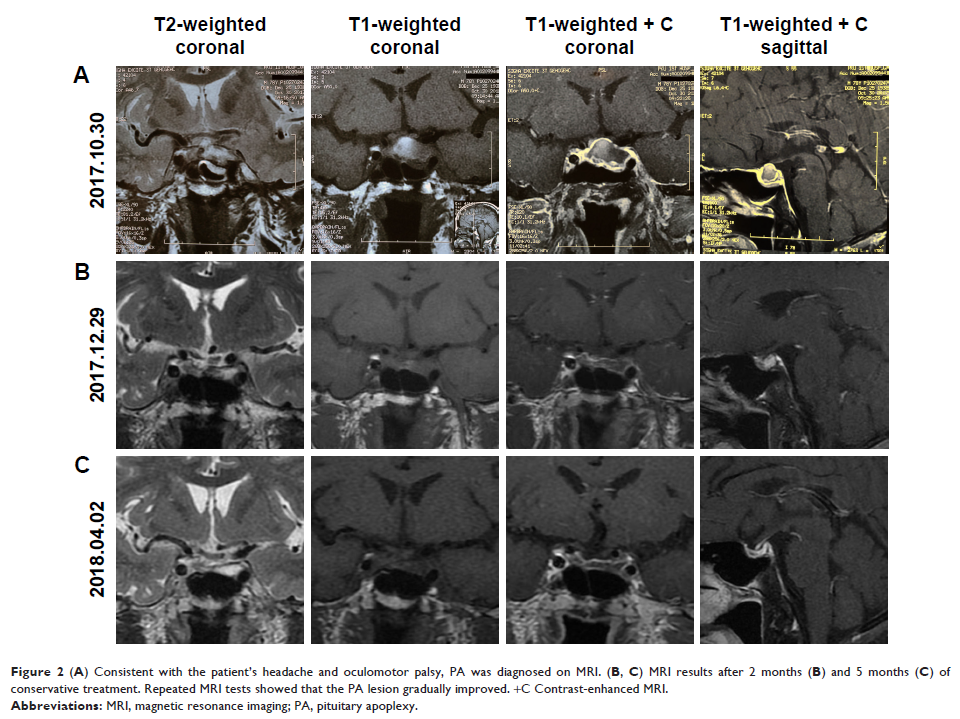108605
论文已发表
注册即可获取德孚的最新动态
IF 收录期刊
- 3.4 Breast Cancer (Dove Med Press)
- 3.2 Clin Epidemiol
- 2.6 Cancer Manag Res
- 2.9 Infect Drug Resist
- 3.7 Clin Interv Aging
- 5.1 Drug Des Dev Ther
- 3.1 Int J Chronic Obstr
- 6.6 Int J Nanomed
- 2.6 Int J Women's Health
- 2.9 Neuropsych Dis Treat
- 2.8 OncoTargets Ther
- 2.0 Patient Prefer Adher
- 2.2 Ther Clin Risk Manag
- 2.5 J Pain Res
- 3.0 Diabet Metab Synd Ob
- 3.2 Psychol Res Behav Ma
- 3.4 Nat Sci Sleep
- 1.8 Pharmgenomics Pers Med
- 2.0 Risk Manag Healthc Policy
- 4.1 J Inflamm Res
- 2.0 Int J Gen Med
- 3.4 J Hepatocell Carcinoma
- 3.0 J Asthma Allergy
- 2.2 Clin Cosmet Investig Dermatol
- 2.4 J Multidiscip Healthc

保守疗法治疗老年垂体卒中患者动眼神经麻痹和视神经受压:一份病例报告和文献系统回顾
Authors Fan Y, Bao X, Wang R
Received 23 July 2018
Accepted for publication 9 September 2018
Published 12 October 2018 Volume 2018:13 Pages 1981—1985
DOI https://doi.org/10.2147/CIA.S181109
Checked for plagiarism Yes
Review by Single-blind
Peer reviewers approved by Dr Andrew Yee
Peer reviewer comments 4
Editor who approved publication: Dr Wu
Background: Whether conservative treatment or surgical management is the most
appropriate treatment for pituitary apoplexy (PA) is controversial. In general,
if severe symptoms of compression occur, such as oculomotor nerve palsy,
neurosurgery is performed to relieve the compression of anatomical structures
near the PA.
Case
description: We describe the case of
a 79-year-old man who was found to have an intrasellar pituitary incidentaloma.
The tumor was discovered accidentally, during an investigation into the cause
of his dizziness. Two months later, he suddenly developed headaches, left ophthalmoplegia,
decreased vision, severe blepharoptosis and diplopia. He was diagnosed with PA
and hypocortisolemia based on magnetic resonance imaging (MRI) and blood tests,
respectively. His symptoms of oculomotor palsy and optic nerve compression were
serious, but his ophthalmological deficits were nonprogressive and his hormone
levels improved through conservative treatment (hydrocortisone
supplementation). Due to this older patient’s poor physical condition and
serious coronary heart disease, after multidisciplinary consultation and
according to his family’s wishes, we continued the conservative treatment and
watched closely for any changes in the patient’s condition. After 6 months of
conservative treatment, the patient’s symptoms of oculomotor nerve paralysis,
pupil and vision defects completely disappeared, and no new complications
occurred. Repeated MRI tests showed that the PA lesion gradually improved. The
patient’s hypocortisolemia was completely relieved through oral supplementation
with low-dose hydrocortisone.
Conclusion: In older PA patients who have surgical contraindications, even
with symptoms of compression, such as oculomotor nerve palsy, according to the
international guidelines, if conservative treatment is effective and the
condition is not progressing, it is possible to monitor patients’ condition
closely and continue conservative treatment, which may yield good results.
Keywords: pituitary apoplexy, oculomotor paralysis, conservative treatment
